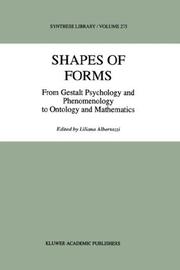| Listing 1 - 3 of 3 |
Sort by
|

ISBN: 0792352467 9048150981 9401729905 9780792352464 Year: 1999 Volume: 275 Publisher: Dordrecht: Kluwer,
Abstract | Keywords | Export | Availability | Bookmark
 Loading...
Loading...Choose an application
- Reference Manager
- EndNote
- RefWorks (Direct export to RefWorks)
impossible triangle, after apprehension of the perceptively given mode of being of that 'object', the visual system assumes that all three sides touch on all three sides, whereas this happens on only one side. In fact, the sides touch only optically, because they are separate in depth. In Meinong's words, Penrose's triangle has been inserted in an 'objective', or in what we would today call a "cognitive schema". Re-examination of the Graz school's theory, as said, sheds light on several problems concerning the theory of perception, and, as Luccio points out in his contribution to this book, it helps to eliminate a number of over-simplistic commonplaces, such as the identification of the cognitivist notion of 'top down' with Wertheimer's 'von oben unten', and of 'bottom up' with his 'von unten nach oben'. In fact, neither Hochberg's and Gregory's 'concept-driven' perception nor Gibson's 'data-driven' perception coincide with the original conception of the Gestalt.
Form (Philosophy) --- Form discrimination --- Form perception --- Forme (Philosophie) --- Perceptie der vormen --- Perception des formes --- Shape discrimination --- Vorm (Filosofie) --- Vormen--Perceptie --- Vormen--Waarneming --- Knowledge, Theory of --- Gestalt psychology --- Phenomenology --- Ontology --- Mathematics --- Théorie de la connaissance --- Gestaltpsychologie --- Phénoménologie --- Ontologie --- Mathématiques --- Congresses --- Philosophy --- Congrès --- Philosophie --- Forme (philosophie) --- Form perception. --- Théorie de la connaissance --- Phénoménologie --- Mathématiques --- Congrès --- Shape perception --- Perception des formes. --- Idealism --- Matter --- Metaphysics --- Structuralism --- Perception --- Visual perception --- Figure-ground perception --- Philosophy and science. --- Psycholinguistics. --- Language and languages—Philosophy. --- Phenomenology . --- Philosophy of Science. --- Philosophy of Language. --- Phenomenology. --- Philosophy, Modern --- Language, Psychology of --- Language and languages --- Psychology of language --- Speech --- Linguistics --- Psychology --- Thought and thinking --- Science and philosophy --- Science --- Psychological aspects
Book
ISBN: 0805810439 Year: 1993 Publisher: Hillsdale, N.J. L. Erlbaum
Abstract | Keywords | Export | Availability | Bookmark
 Loading...
Loading...Choose an application
- Reference Manager
- EndNote
- RefWorks (Direct export to RefWorks)
Cognitieve psychologie --- Cognitive psychology --- Form discrimination --- Form perception --- Mental representation --- Mentale voorstelling --- Mentalisation --- Optics [Psychological ] --- Perceptie --- Perceptie [Visuele ] --- Perceptie der vormen --- Perception --- Perception [Visual ] --- Perception des formes --- Perception visuelle --- Psychologie [Cognitieve ] --- Psychologie cognitive --- Psychology [Cognitive ] --- Representation [Mental ] --- Représentation (Psychologie) --- Représentation mentale --- Shape discrimination --- Vision--Psychological aspects --- Visual perception --- Visuele perceptie --- Visuele waarneming --- Voorstelling [Mentale ] --- Vormen--Perceptie --- Vormen--Waarneming --- Waarneming --- Waarneming [Visuele ] --- Shape perception --- Psychology, Cognitive --- Representation, Mental --- Optics, Psychological --- Vision --- Supraliminal perception --- Psychological aspects --- Visual discrimination --- Cognition --- Apperception --- Senses and sensation --- Thought and thinking --- Abstraction --- Figure-ground perception --- Cognitive science --- Psychology

ISBN: 0792339347 0585284245 9780792339342 Year: 1996 Volume: 147 Publisher: Dordrecht: Kluwer,
Abstract | Keywords | Export | Availability | Bookmark
 Loading...
Loading...Choose an application
- Reference Manager
- EndNote
- RefWorks (Direct export to RefWorks)
Suppose that a congenitally blind person has learned to distinguish and name a sphere and a cube by touch alone. Then imagine that this person suddenly recovers the faculty of sight. Will he be able to distinguish both objects by sight and to say which is the sphere and which the cube? This was the question which the Irish politician and scientist William Molyneux posed in 1688 to John Locke. Molyneux's question has intrigued a wide variety of intellectuals for three centuries. Those who have attempted to solve it include Berkeley, Reid, Leibniz, Voltaire, La Mettrie, Condillac, Diderot, Müller, Helmholtz, William James and Gareth Evans. This book is the first comprehensive survey of the history of the discussion about Molyneux's problem. It will be of interest to historians of both philosophy and psychology.
Form discrimination --- Form perception --- Perceptie der vormen --- Perception des formes --- Shape discrimination --- Vormen--Perceptie --- Vormen--Waarneming --- Touch --- Visual perception --- Empiricism --- Sense (Philosophy) --- Toucher --- Perception visuelle --- Empirisme --- Sensibilité (Philosophie) --- History --- Philosophy --- Histoire --- Philosophie --- Molyneux, William, --- History. --- Electronic books. -- local. --- Form perception -- History. --- Molyneux, William, -- 1656-1698. --- Touch -- History. --- Visual perception -- History. --- Space Perception --- Perception --- Psychology --- Sensation --- Behavioral Sciences --- Mental Processes --- Psychophysiology --- Nervous System Physiological Processes --- Behavioral Disciplines and Activities --- Psychological Phenomena and Processes --- Nervous System Physiological Phenomena --- Psychiatry and Psychology --- Musculoskeletal and Neural Physiological Phenomena --- Phenomena and Processes --- Form Perception --- Psychology, Experimental --- Visual Perception --- Social Sciences --- -Touch --- -Visual perception --- -Optics, Psychological --- Vision --- Visual discrimination --- Feeling --- Haptic sense --- Haptics --- Tactile perception --- Tactual perception --- Somesthesia --- Shape perception --- Figure-ground perception --- Psychological aspects --- Molyneux, William --- -History --- Sensibilité (Philosophie) --- Philosophy. --- Modern philosophy. --- Medicine --- Artificial intelligence. --- Modern Philosophy. --- History, general. --- Artificial Intelligence (incl. Robotics). --- History of Medicine. --- Optics, Psychological --- Mollyneux, William --- Form perception - History. --- Touch - History. --- Philosophy, modern. --- Medicine. --- Artificial Intelligence. --- Medicine—History. --- Visual perception. --- Form perception. --- Touch. --- Visual perception - History. --- Philosophy, Modern. --- Early Modern Philosophy. --- Molyneux (william) --- Formes (esthetique) --- Critique et interpretation
| Listing 1 - 3 of 3 |
Sort by
|

 Search
Search Feedback
Feedback About UniCat
About UniCat  Help
Help News
News